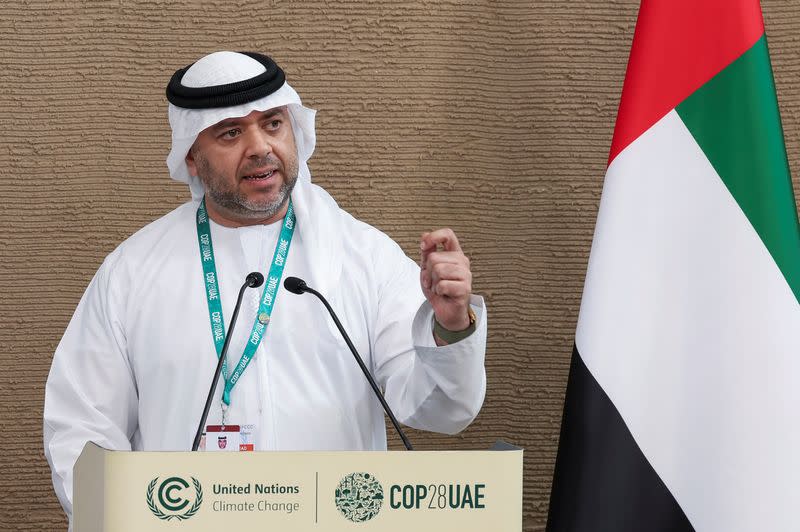The COP28 climate summit in Dubai was heading into extra time on Tuesday, after many countries sought a new draft deal because the previous version was too “weak” – and failed to endorse a “phase-out” of fossil fuels.
COP28 director-general Majid Al Suwaidi said the draft, released on Monday after nearly two weeks of talks, was meant to draw parties into the open and “spark conversations” as they aim to agree on a final deal by the summit’s end.
“By releasing our first draft of the text, we got parties to come to us quickly with those red lines,” he told reporters.
ALSO SEE: US Starts Funding Awards to Ramp up Chip Production at Home
Negotiators from the nearly 200 countries at the summit are attempting to agree on a global plan of action to limit climate change fast enough to avert more disastrous flooding, fatal heat and irreversible changes to the world’s ecosystems.
Al Suwaidi said the COP28 presidency, currently held by the United Arab Emirates, was aiming for a “historic” result that included mentioning fossil fuels – but that it was up to countries to agree.
Deals at UN climate summits must be passed by consensus. Then it is up to individual countries to deliver on the deal, through national policies and investments.
“At this COP we are trying to do something that has never been done before, something historic … Part of this is to include fossil fuels in the text. If we can, that would be historic,” he said.
Firestorm of debate
The draft released on Monday touched off a firestorm of discussions that ran overnight into early Tuesday. The text had suggested eight options countries “could” take to cut emissions.
One was “reducing both consumption and production of fossil fuels, in a just, orderly and equitable manner so as to achieve net zero by, before, or around 2050”.
That would be the first time in history that a UN climate summit has mentioned reducing use of all “fossil fuels”.
But the move fell short of the “phase-out” of coal, oil and gas demanded by many nations, or the emphasis on cutting their use this decade, which scientists say must happen to avoid climate change escalating.
Negotiators were waiting for the new text on Tuesday, when the COP presidency wanted the summit to end. COP summits rarely finish on schedule.
“I’m worried … because it’s very obvious that we need more ambition,” Denmark’s Global Climate Minister Dan Jorgensen said. “I haven’t given up yet of course, we still think this is possible.”
100 nations demand a stronger commitment
The draft was also criticised as too weak by participants such as Australia, Canada, Chile, the European Union, Norway and the United States, among the 100-strong group demanding a firm commitment to wean the world off coal, oil and gas.
Greenhouse gas emissions from burning fossil fuels are the main cause of climate change.
It was unclear if China, the world’s top greenhouse gas emitter, supported Monday’s draft. The country’s veteran climate change envoy, Xie Zhenhua, said progress was being made in the talks, but it was “hard to say” whether agreement could be reached by the end of Tuesday.
Brazil wants a stronger text on ditching fossil fuels, but one that makes clear that rich and poor nations should do so on different timeframes, Environment Minister Marina Silva said.
Representatives of small island nations said they would not approve a deal that was a “death warrant” for vulnerable countries hit hardest by rising sea levels.
OPEC, Saudis fighting mention of fossil fuels
Sources familiar with the discussions said the UAE’s COP28 President Sultan al-Jaber had faced pressure from Saudi Arabia, de facto leader of the OPEC oil producers’ group to which UAE belongs, to drop any mention of fossil fuels – which he did not do.
Saudi Arabia’s government did not respond to requests for comment on Tuesday. A COP28 negotiator for the country declined to comment on the text on Monday night.
In a December 6 letter seen by Reuters, OPEC Secretary General Haitham Al Ghais urged members to reject any COP28 deal that targeted fossil fuels.
Negotiators and observers in the COP28 talks said that while Saudi Arabia has been the strongest opponent, other OPEC and OPEC+ members, including Iran, Iraq and Russia, have also resisted a fossil fuel phase-out in the deal.
“Kuwait works according to a policy based on preserving the sources of petroleum wealth and their optimal exploitation and development,” Oil Minister Saad Al Barrak told the 12th Arab Energy Conference in Doha on Monday.
Despite the rapid growth of renewable energy, fossil fuels still produce about 80% of the world’s energy.
- Reuters with additional editing by Jim Pollard
ALSO SEE:
Push for Phase-Out of Fossil Fuels on the Table at COP28
COP28: Over 110 Nations Join Deal to Triple Renewable Energy
US Pledges $3 Billion for Green Climate Fund at COP28
Cities Lead COP28 Climate Change Push as Nations Fail to Deliver
China Seen Installing 230 GW of Solar & Wind Power in 2023 – PV
























